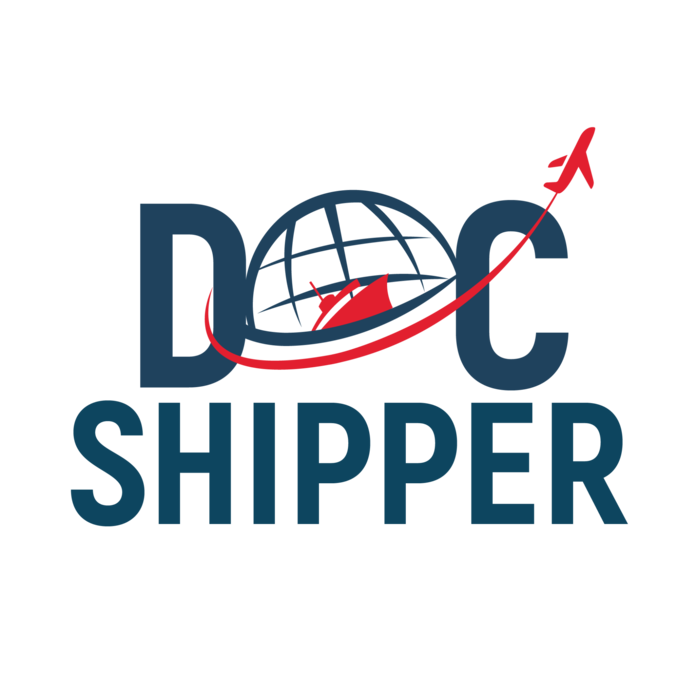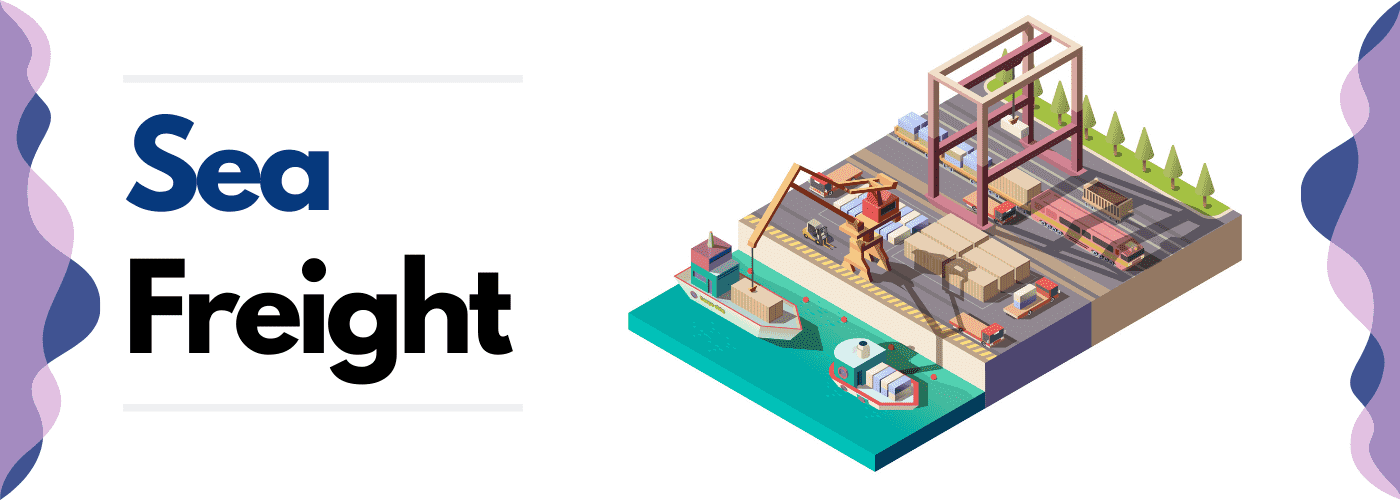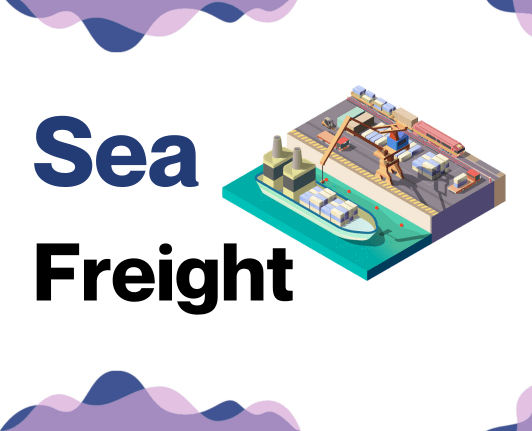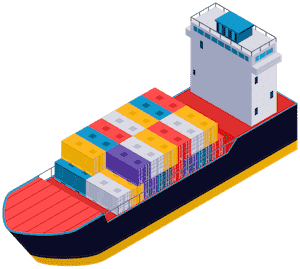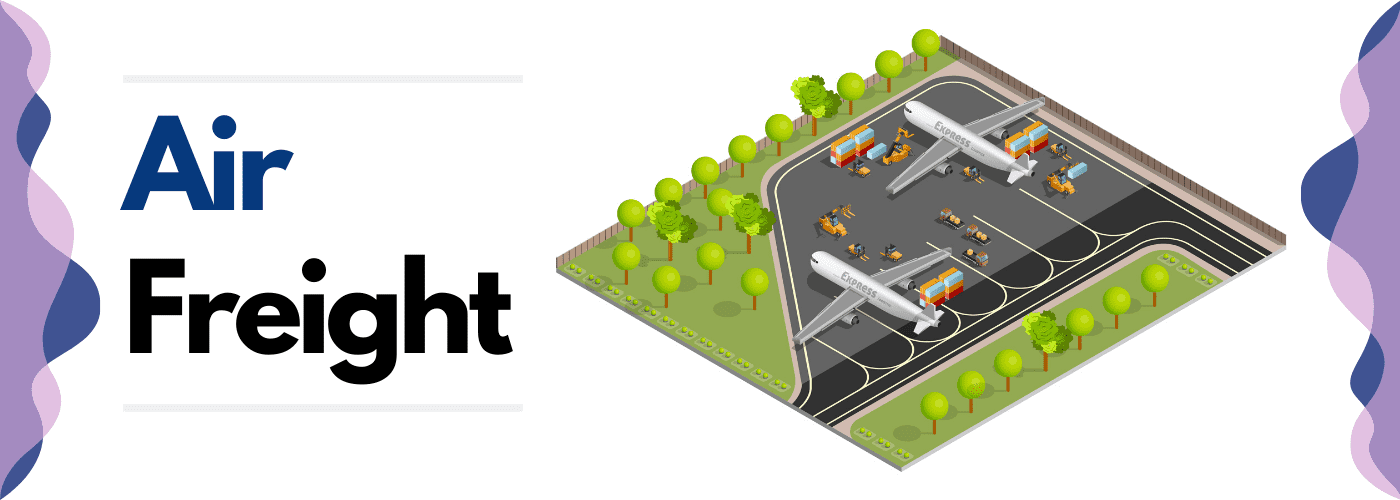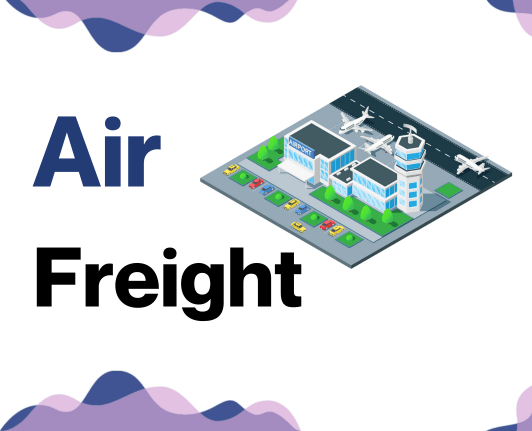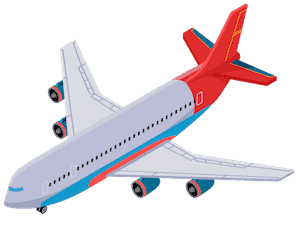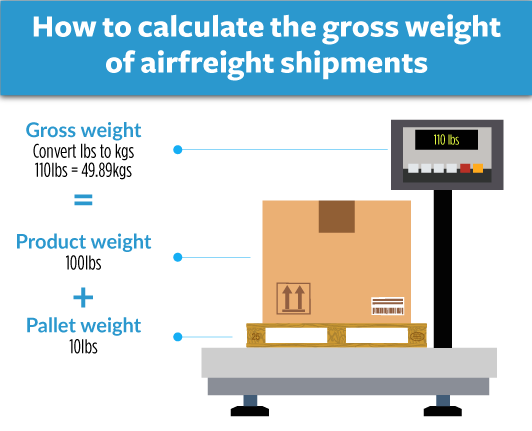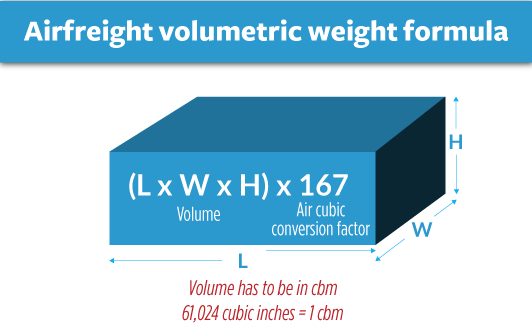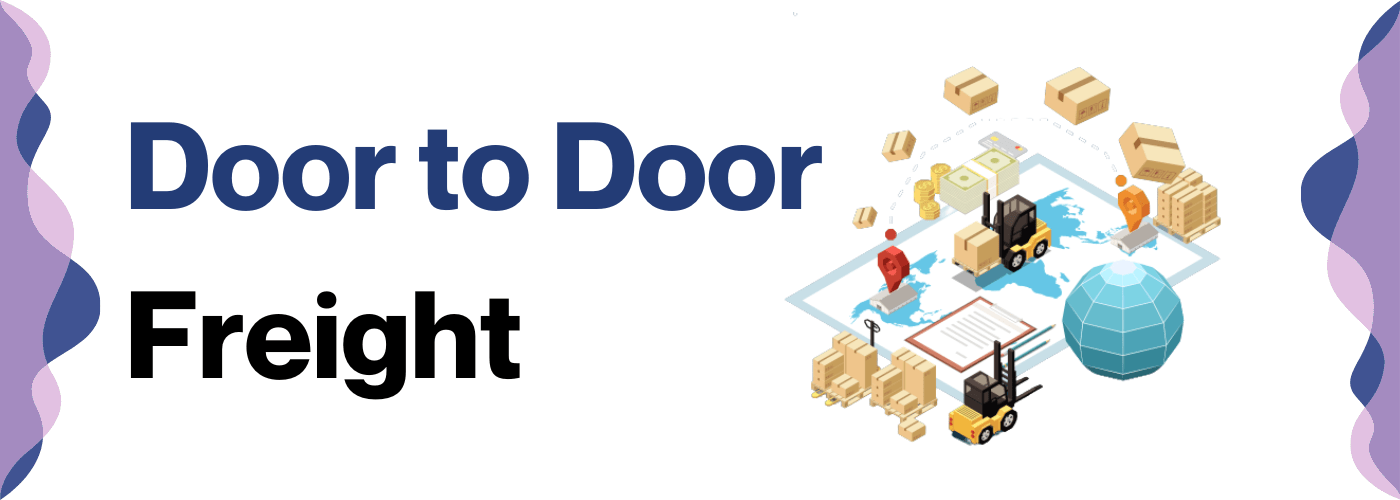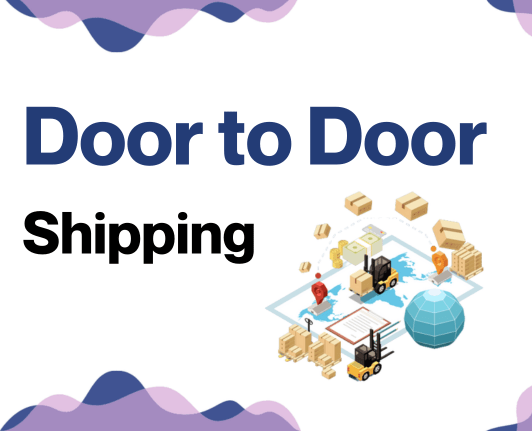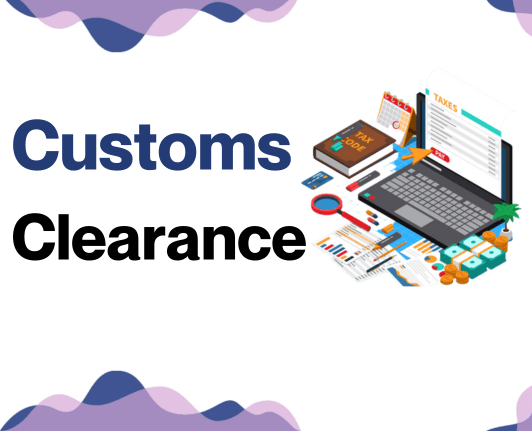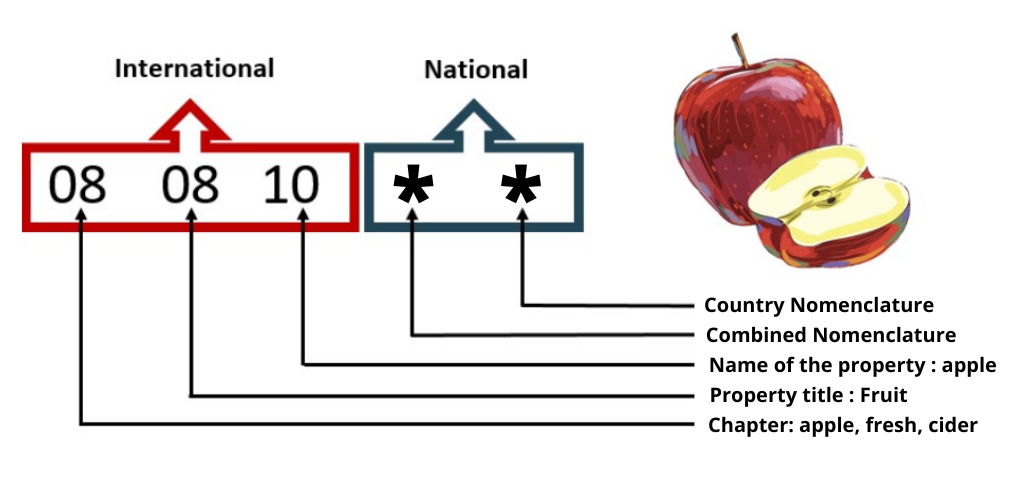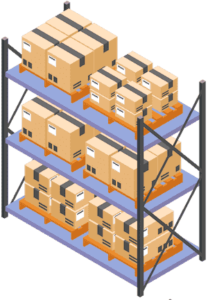Why did the shipping container go to school? Because it wanted to get a little freight smarter! And you're at the right place if your business faces challenges with understanding rates, transit times, and customs regulations when shipping from the US to Algeria.
This comprehensive guide will lead you through all the nitty-gritty details you need to know: from choosing the best freight option - be it air, sea, road, or rail- to mastering customs clearance, decoding duties and taxes, and providing personalized advice for your business.
If the process still feels overwhelming, let DocShipper handle it for you! As a trusted international freight forwarder, we live and breathe logistics, transforming shipping challenges into business success. Let's embark on this journey together.
Table of Contents
ToggleWhich are the different modes of transportation between US and Algeria?
When mapping a route between a hamburger joint in Texas and an olive farm in Algeria, the vast Atlantic Ocean inevitably pops up! It's a gigantic blue puzzle. Picking a transport method isn't about the 'fastest' or 'cheapest' - it's about juggling various factors like your cargo size, urgency, and budget.
If your shipment isn't urgent and can withstand a leisurely sea voyage, then freight ships might be a solid choice. But if you're shipping high-value items that need to be delivered promptly, then air transport could be your ace in the deck. The best choice? It’s a balancing act!
How can DocShipper help?
Shipping goods from the US to Algeria can be daunting, right? DocShipper transforms this complex process into a smooth journey. We handle air, sea or rail freight, customs, and all that tricky paperwork. We've got your shipping needs covered. Need help? Call our consultants for free. Click here for a free estimate in less than 24 hours!
DocShipper Tip: Sea freight might be the best solution for you if:
- You are shipping large volumes or bulky items, as sea freight offers the most space at a cost-effective rate.
- Your cargo doesn't have an urgent deadline, as sea freight typically has longer transit times compared to air or rail.
- Your shipping routes are between major ports, allowing you to leverage the extensive global network of sea shipping lanes.
Sea freight between US and Algeria
The thriving trade relationship between the US and Algeria, anchored by the bustling seaports dotting their landscape, is an arena of endless potential. Consider Port of Mobile in Alabama and Port of Bejaia on the Algerian coast - they embody the bustling vein of shipping large volumes of commodities. Ocean shipping is a cost-effective avenue for businesses dealing with bulky goods. However, the journey is not always smooth.
This section unravels the intricate web of shipping by sea, aligning your business operations with best practices. It's like riding a rollercoaster that’s trodden with weighty ordeals such as intricate customs regulations, paperwork, security, or underestimating transit times.
But don’t fret! You're about to learn how to convert these bends into strategic turns. These insights will arm you with the knowledge you need to circumvent these complexities, empowering your business operations.
Stay tuned! It's time to sail smoothly on this sea of possibilities, undeterred by the brackish waters of sea shipping complexities.
Main shipping ports in US
Port of Los Angeles
Location and Volume: Located in San Pedro Bay, the Port of Los Angeles is the busiest container port in America, handling over 9.2 million TEUs annually.
Key Trading Partners and Strategic Importance: Its strategic importance lies in its accessibility to the trans-Pacific trade routes, with key trading partners including China, Japan, Vietnam, and South Korea.
Context for Businesses: If you're looking to significantly develop your trade links with Asia, the Port of Los Angeles is an essential addition to your logistics chain due to its volume of trade with these countries, and comprehensive rail and highway links for distribution throughout North America.
Port of Long Beach
Location and Volume: Situated in California, the Port of Long Beach ranks second in container volume among U.S. ports. It handled 7.8 million TEUs in 2023.
Key Trading Partners and Strategic Importance: The Port of Long Beach facilitates trade primarily with East Asian countries; its central location on the West Coast enhances its strategic significance.
Context for Businesses: If your business model relies on speed and efficiency, the port's extensive on-dock rail facilities and advanced cargo handling equipment could make it a viable option for your shipping needs.
Port of New York & New Jersey
Location and Volume: Located on the East Coast, the Port of New York and New Jersey is the third largest port in the US, handling over 7 million TEUs, annually.
Key Trading Partners and Strategic Importance: It serves as a critical hub for trade with Europe, Canada, Asia, and the Middle East.
Context for Businesses: Its massive market reach and specialized terminals could make this port an excellent choice if your aim is to develop versatile, wide-ranging shipping strategies.
Port of Savannah
Location and Volume: Located in Georgia, the Port of Savannah is the fourth busiest container port in the U.S., with a volume surpassing 4.9 million TEUs in 2023.
Key Trading Partners and Strategic Importance: The port maintains significant trading relations with China, Germany, and India.
Context for Businesses: If you're seeking to capitalize on a booming consumer market, the Port of Savannah's access to the Southeast and Midwest U.S. makes it ideal for your business.
Port of Houston
Location and Volume: Nestled in Texas, the Port of Houston - the fastest-growing container port in the U.S. - moved roughly 3.8 million TEUs in 2023.
Key Trading Partners and Strategic Importance: The trading partners of the Port of Houston range widely from Mexico, China, to Brazil.
Context for Businesses: The port's robust infrastructure and deepwater access makes it an excellent choice for businesses involved in the energy and petrochemical sectors.
Port of Seattle
Location and Volume: The Port of Seattle, in Washington, handled a shipping volume of about 3.4 million TEUs in 2023.
Key Trading Partners and Strategic Importance: Boasting robust trade ties with countries in Asia like China and Japan, the port plays a key role in trans-Pacific trade.
Context for Businesses: If you are looking to leverage Pacific Northwest's rich consumer markets and expand your Asian connections, the Port of Seattle with its modern facilities, wide-array of services and strategic location, could offer fruitful opportunities.
Main shipping ports in Algeria
Port of Algiers
Location and Volume: The Port of Algiers is located in the capital city of Algeria and is one of the largest ports in North Africa. It handles a shipping volume of over 6 million metric tons of goods.
Key Trading Partners and Strategic Importance: Primary trading partners include countries from the European Union, Middle East, and the United States. The port is strategically important as a hub for both import and export, handling large volumes of containers, bulk, and break-bulk cargo.
Context for Businesses: If you're looking to expand your trade with North Africa, considering the Port of Algiers could be crucial given its large shipping volume and its central role in regional trade.
Port of Annaba
Location and Volume: This port, situated in the northeastern region of Algeria, is the largest port for mineral shipping in the region, with a volume of nearly 3 million metric tons in iron and steel goods alone.
Key Trading Partners and Strategic Importance: The Port of Annaba is linked to markets in Europe, the Middle East, and other parts of Africa. Given its specialty in mineral shipping, it's strategically important for businesses in the iron, steel, and construction industries.
Context for Businesses: If your enterprise operates within raw materials or construction-related industries, the Port of Annaba stands as a potentially essential component of your logistics chain.
Port of Oran
Location and Volume: Located on the northwestern Mediterranean coast of Algeria, the Port of Oran is the country's second-largest port. It processes over 3.5 million metric tons of shipping volume annually.
Key Trading Partners and Strategic Importance: Its principal trading partners are in the European Union, however, the port also has strong links with North America and the Far East. Oran is crucial for general merchandise and bulk cargo.
Context for Businesses: If your strategy aims at diversifying your trade to reach different markets, incorporating the Port of Oran may be a beneficial move.
Port of Bejaia
Location and Volume: Located centrally on Algeria's northern coastline, the Port of Bejaia handles a shipping volume of over 9 million metric tons annually.
Key Trading Partners and Strategic Importance: It has varied trading partners within Europe, Americas, and Asia. Known for its high-capacity container terminals, it's strategically crucial for businesses transporting large amounts of goods.
Context for Businesses: If you're operating in fast-paced industries that require swift container handling and international reach, the Port of Bejaia might be significant for your operations.
Port of Skikda
Location and Volume: Positioned towards the east of Algiers, the Port of Skikda is vital for petroleum shipping with a considerable volume of 60 million metric tons annually.
Key Trading Partners and Strategic Importance: Primarily connected with Middle Eastern, European, and Asian petroleum markets, it's strategically significant for the oil and gas industries, given that it's one of the world's largest petroleum ports.
Context for Businesses: If you're in the petroleum sector seeking to capitalize on global markets, targeting your operations towards the Port of Skikda might be worth considering.
Port of Ghazaouet
Location and Volume: Situated close to the Moroccan border on the western Mediterranean sea coast, the Port of Ghazaouet deals with a diverse range of shipping, including roll-on/roll-off RoRo traffic.
Key Trading Partners and Strategic Importance: A wide range of trading partners encompass Europe and the Middle East. Its multipurpose handling facilities make it strategically vital for diverse supply chains.
Context for Businesses: If your needs involve a versatile supply chain catering to different types of cargo, integrating the Port of Ghazaouet into your strategies could be a practical decision.
Should I choose FCL or LCL when shipping between US and Algeria?
Shipping your goods between the U.S and Algeria? You're likely weighing up your options between Consolidation (LCL) and a Full Container Load (FCL). It's more than a simple choice - getting it right plays a pivotal role in dictating your costs, timelines, and ultimately, the success of your shipping process.
In the following section, we'll unravel the differences and help you pinpoint which option aligns best with your specific needs – elevating your business efficiency and ensuring your international shipping journey runs as smooth as possible.
LCL: Less than Container Load
Definition: LCL (Less than Container Load) shipping pertains to transportations for which the volume of goods is not enough to fill an entire container. Therefore, several smaller shipments from different shippers are consolidated into one container.
When to Use: Consider LCL shipment when your cargo volume is less than 15 cubic meters (CBM). Since it doesn't warrant a full container, it can share space with other shipments, providing flexibility for low-volume shipments.
Example: Suppose you're a business based in the US shipping artisanal crafts to Algeria. If your shipment only takes up 10 CBM, choosing LCL freight will be cost-effective and eco-friendlier, as you're sharing a container with other businesses which maximizes its usage.
Cost Implications: The great thing about LCL shipment is that you only pay for the space you need, making it a cost-effective option for smaller shipments. However, be mindful of potential additional charges, like deconsolidation fees when the shared container is unpacked at the destination.
FCL: Full Container Load
Definition: FCL, or Full Container Load, refers to a shipping method where a single cargo occupies the entire container, be it a 20'ft or a 40'ft container.
When to Use: Opt for FCL if your cargo volume exceeds 13/14/15 Cubic Meters (CBM). It offers cheaper per unit freights for high volume shipments and guarantees the safety of your goods, as the FCL container is sealed at the origin and opened only at the destination.
Example: Imagine you're shipping large machinery parts from Houston to Algiers. With the volume exceeding 15 CBM, going the FCL route proves to be economical, and the sealed container ensures your delicate parts aren't mixed and possibly damaged with other shippers' goods.
Cost Implications: While obtaining an FCL shipping quote, remember that even though the upfront costs might seem steep, the unit cost will decrease significantly with higher volumes. Moreover, decide between the 20'ft and 40'ft container size based on your volume for more cost-effective FCL shipping. It's an investment that ensures the safety of your shipped goods and offers relief from potential logistical headaches, making it worth every penny.
Unlock hassle-free shipping
With DocShipper, transporting cargo from the US to Algeria is made simple and stress-free. Our ocean freight professionals help you decide between consolidation or shipping a full container, gauging the best choice based on factors like the nature of goods, your budget, shipping time, and volume of goods. Let’s optimize your shipping process today. Get started with a free estimate to see how DocShipper can be your solution to uncomplicated shipping!
How long does sea freight take between US and Algeria?
Average sea freight times from the US to Algeria tend to span approximately 14 to 28 days, depending on a variety of factors. These factors include the specific ports used, the weight of the goods, and the nature of the goods being shipped. For a quote tailored to your specific needs, we highly recommend reaching out to a trusted freight forwarder like DocShipper.
Here's a breakdown of average transit times (in days) for sea freight between the primary freight ports in both countries:
| US Ports | Algeria Ports | Transit Times |
| Port of New York | Port of Algiers | 20 |
| Port of Los Angeles | Port of Bejaia | 33 |
| Port of Houston | Port of Oran | 47 |
| Port of Savannah | Port of Annaba | 22 |
*Note: The exact transit times can vary based on multiple factors and these are only averages. For accurate estimates, please contact your freight forwarder.
How much does it cost to ship a container between US and Algeria?
Determining the exact shipping cost from the US to Algeria can be as fickle as the ocean waves. That's due to a sea of elements such as Point of Loading, Point of Destination, the carrier, nature of goods, and even the monthly market fluctuations that impact ocean freight rates.
While we can't provide an anchor on precise numbers with the rates roughly ranging per CBM, we aim to navigate you through these choppy waters, ensuring smooth sailing.
Rest assured, our shipping specialists will weigh anchor to your unique circumstances, quoting on a case-by-case basis, providing you with the best rates for your voyage. So, remember, you're not just shipping a container; you're charting a course with us.
Special transportation services
Out of Gauge (OOG) Container
Definition: Out of Gauge (OOG) containers are specially designed to transport cargo that doesn't fit in standard containers due to their large size or weight.
Suitable for: OOG containers are perfect for massive equipment, heavy machinery, large engines, and any other substantial out of gauge cargo.
Examples: Industrial equipment like turbines, caterpillar machinery, or large pipes could be shipped using this method.
Why it might be the best choice for you: If you have substantial items that exceed regular container dimensions, OOG containers provide an exact fit, ensuring efficient and safe shipment.
Break Bulk
Definition: Break bulk refers to goods that cannot be transported in a container due to size, shape, or quantity and need to be loaded individually.
Suitable for: Suitable for a wide variety of goods such as construction materials, steel products, or even yachts.
Examples: items like steel beams, fire trucks, or even helicopters qualify for break bulk shipping.
Why it might be the best choice for you: If your business deals with unique items that won't fit into standard containers, break bulk shipping can offer tailormade solutions.
Dry Bulk
Definition: Dry bulk shipping refers to transporting goods in loose form like grains, ores, or coal in substantial quantities.
Suitable for: This method is perfect for commodities that can be poured and don't require packaging.
Examples: Goods like iron ore, cement, grains, sugar fall into this category.
Why it might be the best choice for you: Dry bulk is ideal if your goods are granular or powdered, and you need to ship them in large amounts.
Roll-on/Roll-off (Ro-Ro)
Definition: Roll-on/Roll-off (Ro-Ro) involves vehicles and machinery that are driven on and off the ro-ro vessel under their own power or using a platform vehicle.
Suitable for: Ro-Ro is best for items that can be wheeled on and off, such as cars, trucks, or trailers.
Examples: Automobiles, trailers, motorhomes are common cargoes for Ro-Ro shipping.
Why it might be the best choice for you: If you're dealing with vehicles or wheeled machinery, Ro-Ro shipping offers a straightforward and efficient approach for your cargo transportation needs.
Reefer Containers
Definition: Reefer containers are refrigerated shipping containers used for transporting goods that require temperature control.
Suitable for: Best for perishable items, such as fruits, vegetables, fish, meat, dairy products, or pharmaceutical goods.
Examples: Tropical fruits like bananas or critical medicines are typically shipped in reefer containers.
Why it might be the best choice for you: If your products need to remain chilled or frozen during transport, you'll benefit greatly from the controlled environment that reefer containers provide.
At DocShipper, helping you navigate these shipping options is what we do best. For a free shipping quote in less than 24h, don't hesitate to contact us.
DocShipper Tip: Air freight might be the best solution for you if:
- You are in a hurry or have a strict deadline requirement, as air freight offers the fastest transit times.
- Your cargo is less than 2 CBM (Cubic Meter), making it more suitable for smaller shipments.
- Your shipment needs to reach a destination that is not easily accessible by sea or rail, allowing you to tap into the extensive network of global airports.
Air freight between US and Algeria
Shipping between the US and Algeria? Air freight shines as a quick and reliable option. Picture this - Your business can zoom a batch of designer watches or critical pharmaceutical products across continents the same way you would express mail a birthday card.
However, fast with a jet engine comes at a premium, making air freight a top choice for smaller, high-value items, not bulk shipments of bowling balls. The key here lies in pricing, with a notable caveat - it's not just about physical weight. Strangely enough, thinking in 'volume weight' is a common blunder which can inflate your shipping costs like a hot air balloon.
So, before you ship those 'lightweight' foam fingers or pillow seats, remember: air freight rates have a more 'dense' side to you'd need to consider. Dive into this guide and you'll soon see how easily it is to trip up, unknowingly contributing to surpassing your shipping budget sooner than you'd like. But there's no need to fear, this guide is your map, your GPS, your lifesaver! Let's ensure every shipment is no less than a bullseye hit.
Air Cargo vs Express Air Freight: How should I ship?
Choosing between Air Cargo and Express Air Freight for your US-Algeria shipping could feel like a tricky decision. Put simply, with the former, your freight flies passenger-style in an airline amidst other cargo, while the latter flies in style - on a dedicated plane, zipping directly to its destination. Let's dive in and untangle the specifics which might be critical to your business needs.
Should I choose Air Cargo between US and Algeria?
Considering the efficiency and cost implications of your shipping needs, air cargo can be an advantageous solution for transporting goods between the US and Algeria. Airlines such as American Airlines and Air Algérie offer consistent and reliable services for this route.
While the transit times can be longer due to fixed schedules, this method considerably pays off for shipments over 100/150 kg (220/330 lbs), becoming a more cost-effective choice. So, if your budget aligns, choosing air cargo between these two countries might be the optimal choice for your business.
Should I choose Express Air Freight between US and Algeria?
Express air freight is a specialized service that employs dedicated cargo planes with zero passengers, catering solely to your shipment. This mode is substantial if you're transporting less than 1 cubic meter or weight falls under 100/150 kg (220/330 lbs).
Considering their efficiency and quick transit times, express services offered by reputed courier firms like FedEx, UPS or DHL are excellent choices. The speed and reliability of these services maximize the chances of your goods arriving safely and promptly, suiting your business needs especially when shipping time-sensitive cargo between the US and Algeria.
Main international airports in US
Los Angeles International Airport (LAX)
Cargo Volume: Los Angeles International Airport processes over 2 million metric tons of cargo annually.
Key Trading Partners: China, Japan, and Australia are key trading partners.
Strategic Importance: LAX is strategically located as a gateway to the Asia-Pacific region, ensuring fast and efficient transport of goods.
Notable Features: It hosts a fast-track customs facility for expedited cargo clearance and boasts a modern, high-capacity cargo terminal.
For Your Business: LAX provides timely, efficient access to key international markets, ideal for businesses requiring quick transit times.
Miami International Airport (MIA)
Cargo Volume: With an annual cargo volume of over 2.3 million metric tons, MIA ranks first in the US for international freight.
Key Trading Partners: Among its main trading partners are Latin American and Caribbean countries.
Strategic Importance: MIA offers the business advantage of being the closest US airport to Latin America, a major global economic powerhouse.
Notable Features: MIA features an extensive perishable cargo facility, a key factor for businesses dealing with temperature-sensitive goods.
For Your Business: This airport is ideal if your business focuses on trade with Latin America, or deals with perishable goods.
John F. Kennedy International Airport (JFK)
Cargo Volume: JFK handles about 1.5 million metric tons of cargo annually.
Key Trading Partners: Main trading partners include the European Union, Canada, and China.
Strategic Importance: JFK's location on the East Coast gives it strategic importance for transatlantic trade.
Notable Features: Features include specialist facilities for valuable freight like textiles, pharmaceuticals, and electronics.
For Your Business: Its strong connections with Europe make JFK a smart choice for businesses with strong trading ties to this region.
Chicago O’Hare International Airport (ORD)
Cargo Volume: ORD processes more than 1.8 million metric tons of cargo annually.
Key Trading Partners: ORD connects with major markets in Europe, Asia, and South America.
Strategic Importance: Its central location makes it a hub for both domestic and international shipments.
Notable Features: ORD has a special freight handling facility for oversized cargo, along with a world-class infrastructure for efficient loading and offloading.
For Your Business: If you're dealing with oversized cargo or prefer a well-connected central hub, ORD serves as an excellent choice.
Hartsfield–Jackson Atlanta International Airport (ATL)
Cargo Volume: ATL handles over 2.7 million metric tons of cargo per year.
Key Trading Partners: This airport serves key markets around the globe including Europe, Asia, and Africa.
Strategic Importance: Known as the world's busiest airport by passenger traffic, it also serves as a key hub for domestic and international cargo shipments.
Notable Features: ATL features a state-of-the-art perishable cargo complex and advanced animal handling facilities.
For Your Business: ATL's extensive connectivity and specialized facilities make it a versatile choice for various business shipping demands.
Main international airports in Algeria
Houari Boumediene Airport
Cargo Volume: Annually, this airport manages around 35,000 tons of cargo.
Key Trading Partners: France, Italy, Spain, Germany, China are some of the main trading partners.
Strategic Importance: Located in Algiers, the capital of Algeria, this airport is the hub for Air Algerie and Tassili Airlines, making it a vital connector for both passenger and cargo flights.
Notable Features: With a variety of cargo handling services available round the clock, goods storage, and quick customs procedures, this airport is well-equipped to handle diverse shipping demands.
For Your Business: If you're shipping goods to Europe or North Africa, Houari Boumediene's extensive network and experienced handling could simplify your logistics process while reducing time.
Oran International Airport (Ahmed Ben Bella Airport)
Cargo Volume: It manages a significant volume of 16,000 tons per annum, playing a notable role in Algeria's freight industry.
Key Trading Partners: Major trading partners include France, Spain, Morocco, and some Middle Eastern countries.
Strategic Importance: Located in Oran, a major port city in northwest Algeria, this international airport offers connections with major African and European cities, boosting the region's commerce.
Notable Features: It provides efficient cargo handling services, a modern infrastructure for air freight, and simplified customs procedures.
For Your Business: If your company operates within Northern Africa or Europe, consider Oran International as a viable choice, especially for high-value goods due to its excellent security standards.
Annaba Rabah Bitat Airport
Cargo Volume: Annually, it handles around 1,500 tons of cargo.
Key Trading Partners: Key trading partners involve France, Italy, Germany, and Spain mainly.
Strategic Importance: Situated in Annaba, an important industrial center and a significant port in eastern Algeria, this airport plays a crucial role in regional import-export activities.
Notable Features: This airport is known for its efficient cargo handling services and well-managed protocols facilitating quick customs clearance.
For Your Business: If you're dealing in the shipping of industrial goods, Annaba Rabah Bitat Airport can offer advantageous connections to various European and North African countries.
Ain Arnat Airport
Cargo Volume: This airport handles approximately 1,100 tons of cargo annually.
Key Trading Partners: France, Italy, Spain, Germany are the primary trading partners.
Strategic Importance: Located in Setif, a bustling city in the interior of Algeria, this airport connects diverse regional centers to major world economies.
Notable Features: It boasts reliable cargo handling services and quick customs procedures, aided by its modern infrastructure.
For Your Business: If your shipping operations revolve around the European and North African market, Ain Arnat's quick customs clearance could help speed up your freight timelines.
Tlemcen Zenata – Messali El Hadj Airport
Cargo Volume: It takes care of nearly 1,000 tons of freight annually.
Key Trading Partners: The airport mainly trades with France, Spain, Germany, and Italy.
Strategic Importance: As the only international airport in the province of Tlemcen, this airport acts as a major cargo gateway in western Algeria.
Notable Features: Known for its round-the-clock cargo handling services, this airport ensures efficient goods processing and timely customs clearances.
For Your Business: If you're looking to tap into the markets of Western Algeria, consider Tlemcen Zenata as a strategic partner, given its convenient location and efficient cargo capabilities.
How long does air freight take between US and Algeria?
Generally, air freight shipping time between the US and Algeria averages between 1-3 days. However, the exact timing varies depending on several factors. The specific airports in both countries, the weight of your shipment, and the nature of the goods you're shipping can all influence transit times. For more precise shipping schedules, it's recommended to consult with a dedicated freight forwarder like DocShipper.
How much does it cost to ship a parcel between US and Algeria with air freight?
The average shipping rate for air freight between the US and Algeria can range from $3-10/kg, but please note this is a broad estimate. An exact rate is hard to pinpoint due to varying factors such as the distance between departure and arrival airports, parcel dimensions, weight, and nature of the goods.
Rest assured, we work closely with our clients to engineer the best possible rates, providing personalized quotes on a case-by-case basis. Need a quote? Contact us and receive one for free, typically within 24 hours.
What is the difference between volumetric and gross weight?
Gross weight refers to the total weight of a shipment, including goods, packaging, pallets, and any other materials. Volumetric weight, on the other hand, is a calculation that reflects the density of a shipment. It considers the space your goods take up on an aircraft, rather than just the physical weight.
For air cargo, gross weight and volumetric weight are calculated differently. Gross weight is straightforward - you weigh your total shipment and that's your gross weight. However, volumetric weight requires some arithmetic. You multiply the length, width, and height of each parcel in centimeters and then divide by 6,000.
Let's say we have a box with dimensions 40cm x 30cm x 25cm and a gross weight of 25 kg. The volumetric weight will be (40 x 30 x 25) / 6000, which equals 5 kg. In pounds, these weights are 55 lbs and 11 lbs, respectively.
Express Air Freight works similarly, but uses a different divisor. The dimensions of each parcel in centimeters are still multiplied, but now divided by 5,000 instead.
Volumetric and gross weight matter because freight charges are based on the greater of the two. This ensures carriers are compensated for both the weight and space taken up by your shipment. It's wise to calculate both weights to prevent unexpected freight costs.
DocShipper tip: Door to Door might be the best solution for you if:
- You value convenience and want a seamless shipping process, as door-to-door takes care of every step from pickup to delivery.
- You prefer a single point of contact, as door-to-door services typically provide a dedicated agent to handle all aspects of the shipment.
- You want to minimize the handling of your goods, reducing the risk of damage or loss, as door-to-door minimizes transitions between different modes of transport.
Door to door between US and Algeria
Door-to-door shipping, your all-inclusive route from the US to Algeria, incorporates every shipping process from pickup to delivery at the doorstep. This seamless option provides numerous benefits, including administrative ease and hassle-free logistics. Ready to explore how this solution might just be your secret to efficient, worry-free shipping? Let's dive in!
Overview – Door to Door
Tired of managing complex shipping procedures? Door-to-door shipping from the US to Algeria is a lifesaver! This stress-free service takes care of everything, from pickup at origin to delivery at your Algerian location.
It includes transport, customs clearance, and administrative tasks - a complete package! Yes, it might cost a tad more but the convenience is worth it. It's no wonder this all-in-one solution is DOCShipper's top pick among clients.
Stay tuned as we delve deeper into the intricacies, benefits, and potential drawbacks of this highly sought-after shipping service, equipping you with practical insights for a seamless shipping experience!
Why should I use a Door to Door service between US and Algeria?
Ever juggled flaming torches while riding a unicycle? That's what managing logistics can feel like without Door-to-Door services when you're shipping from the U.S. to Algeria! Here's why you might want to consider it:
1. Wave Goodbye to Pickup Hassles: One of the major perks of using a Door-to-Door service is goodbye to the logistics of pick-up. From neatly packaging goods to determining the best route, it's all taken care of!
2. Meet Your Timelines Head On: Urgent shipments? No worries, Door-to-Door services aim to meet (and often exceed!) your delivery schedules, ensuring your goods arrive on or before your expected deadline.
3. Complex Cargo Handled with Care: Cool sculpture or odd-sized machinery to ship? No problem. Specialized care for complex cargo is a cornerstone of Door-to-Door services, with experts handling your 'not-so-average' items from pickup to final delivery.
4. Logistics Relief: Here's the deal - logistics can be puzzling. With Door-to-Door services, you can sit back and relax while they navigate customs clearance, permits and the stack of paperwork - talk about stress-buster!
5. Convenience to the Max: Imagine your shipment being trucked all the way from the U.S. to the sunny shores of Algiers, without lifting a finger (well, apart from the one used to dial the service). Yes, Door to Door takes 'convenience' to a whole new level!
See? It's just like swapping flaming torches and a unicycle for a cup of tea. Straight-up, stress-free, and still quite the spectacle!
DocShipper – Door to Door specialist between US and Algeria
Sailing smoothly from the U.S. to Algeria, DocShipper takes over your shipping responsibilities from start to finish. We are the proficient conductors orchestrating each step: packing your merchandise, choosing the best shipping method, navigating customs, ensuring safe and punctual arrival.
We even assign a dedicated Account Executive just for you. With us, you won't have to lift a finger. Reach out for a free estimate within 24 hours, or dial up our expert consultants for free advice. Shipping has never been so stress-free.
Customs clearance in Algeria for goods imported from US
Venturing into the labyrinth of customs clearance in Algeria from the US? It's not an easy ride. Behind what appears straightforward, you'll find a maze of duties, taxes, quotas, and licenses.
Even a small step amiss can lead to a torrent of unexpected fees or worse - goods languishing in customs purgatory. Fear not, we'll dissect these intricacies, arming you with the knowledge to navigate this process smoothly.
Furthermore, your shipping partner, DocShipper, stands ready to guide you along each step. From furniture to electronics, whether in Paris or New York, simply share your goods' origin, their value, and the HS Code for a seamless experience.
Get in touch if you need an estimate to fund your project. Remember, these three keys unlock accurate budget estimations.
How to calculate duties & taxes when importing from US to Algeria?
Navigating the estimated duties and taxes when importing goods from the US to Algeria begins with gathering the necessary information. The key elements you'll need include the country of origin, the HS code of your products, the customs value, the applicable tariff rate, and special taxes and fees that might apply. It's like putting together a puzzle where every piece matters, and each one can influence the total cost of import.
Now, the journey of estimation always starts at the source. The first step is to pinpoint the geographical location where the goods were manufactured or produced.
This might sound simple, but given the sprawling supply chains of today's global market, it's a detail you can't afford to overlook. Acknowledging the correct country of origin sets the stage for all future calculations and can deeply affect your duty rates. Establish this detail and you’ve set a solid groundwork for your shipping estimate.
Step 1 - Identify the Country of Origin
Knowing your product's country of origin is crucial - let's unravel the why.
Firstly, it begets the Harmonized System (HS) code, shaping all future customs operations. Secondly, applicable duties and taxes are incessantly tied to the country of origin - sneak peeks of this include 'Most Favored Nation' tariffs. Third reason? Trade agreements! The US-Algeria trade agreement offers preferential duties. You don't want to miss these savings. Fourth, specific regulations often hitch a ride with your product's nationality. Don't let surprise rules trip you up at the border. Lastly, the country of origin affects import restrictions - catch these early to save time and money.
US to Algeria means free trade benefits - lower customs duties, relaxed import rules, and even simplified customs procedures. Do take advantage of these perks.
Remember, some goods may face Algeria's wrath - the country enforces precise restrictions on certain US agricultural goods. Knowledge is power - these insights could let you neatly sidestep potential pitfalls or delays.
That's your first step - start with a strong footing in your product's origins and watch your shipping thrive.
Step 2 - Find the HS Code of your product
The Harmonized System Code, or HS Code, is a standardized numerical method of classifying traded products. It is used by customs authorities around the world to identify products when assessing duties and taxes and for gathering statistics. You could say it's like the DNA of international trade as it precisely identifies what's being exported or imported.
In most cases, the easiest way to find the HS Code of your product is to simply ask your supplier. They are most likely familiar with the products they are sending and the associated regulations.
If this is not possible, don't worry, we can guide you on finding your product's HS Code. Here is a straightforward step-by-step guide to help you:
1. Use an HS code lookup tool like the Harmonized Tariff Schedule
2. Search your product name in the provided search bar.
3. Check the Heading/Subheading column to locate the HS code for your product.
Please take note, accuracy is of utmost importance when identifying your HS Code. Mistakes can cause shipment delays and can even lead to potential fines, so ensure the code matches your product exactly.
Here's an infographic showing you how to read an HS code. With this tool, you're ready to confidently navigate the world of international logistics.
Step 3 - Calculate the Customs Value
In the world of international shipping, it's essential to remember that the 'Customs Value' is a bit different from the actual product value you're used to. It's not just about the price tag on those items you're shipping from the US to Algeria.
Instead, consider the 'Customs Value', often deemed as the CIF value (Cost, Insurance, and Freight), incorporating the total cost of the goods, the expenses for international transport, and the insurance cost.
Let's say you're shipping machinery valued at $10,000, with a shipment and insurance costing $2000. In this case, the Customs Value, the magic number you'll use for customs clearance in Algeria, is $12,000 (Product Value + Shipping and Insurance).
Understanding this concept is key in handling customs smoothly, avoiding unexpected costs, and ensuring your freight delivers on time. Always keep an eye on those extra numbers to sidestep any unwanted surprises.
Step 4 - Figure out the applicable Import Tariff
In the world of international trade, an import tariff is essentially a tax that a country imposes on incoming goods from abroad. It's crucial to identify these, as they directly affect the overall cost of your import operation.
Now, relating to your specific shipping need from the US to Algeria, the tariff system used is the Harmonized System (HS), a globally accepted classification system for goods.
To find out the tariff for your goods, let's consider an example with HS Code 610442 (Women's or girls' cotton dresses). Here are the steps:
1. Go to the Algerian Customs website, or contact your local customs agent, and input the HS code identified earlier.
2. The website or agent will provide the applicable tariff for your product.
Let's say the tariff rate is 30%. If your imported dresses have a Cost, Insurance, and Freight (CIF) value of USD 10,000, the import duty will be 30%*10,000 = USD 3,000.
Understanding your tariff is an integral part of the import process, helping to plan effectively for the costs associated with your shipment.
Step 5 - Consider other Import Duties and Taxes
When it comes to importing goods into Algeria from the US, there's more to consider than just the standard tariff rate. Different types of additional import duties may be imposed, each depending entirely on the country of origin and the nature of the product.
For instance, excise duty might apply to certain items, while anti-dumping taxes could also be levied if the product is considered to be priced at less than fair value.
One crucial aspect not to overlook is VAT, which stands for Value Added Tax. For Algeria, the standard VAT rate is 19%, but exceptions may exist for specific products. The application of VAT will increase the total cost of your imports, and it is calculated as a percentage of the CIF value (Cost, Insurance and Freight) plus all import duties.
Here's a basic formula: (CIF value + All Import Duties) x VAT rate
Let's suppose you're importing cosmetic products worth $10,000. Your total import duty might be $1500 (hypothetically). Your VAT would then be ($10,000 + $1500) x 19% = $2185.
Remember, this is a simplified example and real-world scenarios can be complex. It's crucial to acquire the most accurate and current information before initiating any shipping activities.
Step 6 - Calculate the Customs Duties
Begin your journey down the complex path of customs duty calculations by understanding a simple formula: Customs Value + VAT (Value Added Tax) + Anti-dumping taxes. Every country imposes different rates, so the crux of this process is understanding and applying these rates accurately to your shipment.
Consider three different scenarios for goods imported from the US to Algeria:
1. Only Customs Duty Involved: If you're importing car parts worth $1000 and the customs duty is 15%, you merely multiply the two: $1000 15/100 = $150. Your customs duty here is $150- no VAT involved.
2. Customs Duty and VAT Involved: With shipments of industrial machinery valued at $8000 attracting a 10% customs duty and 19% VAT, we calculate as follows: Customs Duty = $8000 10/100 =$800; VAT = ($8000+$800) 19/100 = $1662. Your total cost becomes $800 + $1662 = $2462.
3. Complete Inclusion: For a fancy wine shipment valued at $5000 with a 20% customs duty, 19% VAT, 5% anti-dumping, and 25% Excise: Customs Duty = $5000 20/100 = $1000, VAT = ($5000+$1000) 19/100 = $1140, Anti-Dumping = $5000 5/100 = $250, and Excise Duty = $5000 25/100 = $1250. The total here comes to $1000 + $1140 + $250 + $1250 = $3640.
Navigating these steps can prove tedious, but we at DocShipper offer full-spectrum customs clearance services globally. Trust us to ensure you aren't overcharged and reach out for your free quote within 24h.
Does DocShipper charge customs fees?
Understanding shipping fees is essential. As an independent customs broker, DocShipper in the US and Algeria doesn't charge customs duties. These are separate from customs clearance fees which you will incur with us or any broker.
Draw a clear line: clearance fees for our services, duties, and taxes go straight to the government. Rest assured, we'll give you official paperwork from customs, confirming you've only paid your due duties. This transparency ensures you stay in control of your shipping costs, making international trade less daunting.
Contact Details for Customs Authorities
Algeria Customs
Official name: Algeria Customs Directorate General
Official website: https://www.douane.gov.dz/?lang=fr
Required documents for customs clearance
Mastering customs paperwork can be daunting, but it's key to smooth international shipping. Up next, we'll tackle the Bill of Lading, Packing List, Certificate of Origin, and CE Standard Documents of Conformity to help you prepare without the overwhelm.
Bill of Lading
Navigating international trade between the US and Algeria? A Bill of Lading is your navigation chart. This official document serves as a receipt for your cargo and signifies the transfer of ownership - a real turnkey moment in your logistics operation.
It's worth noting that the 'telex' or electronic release not only speeds up the process for you but also slims down the paper trail, adding that environmental cherry on top of your trade cake. For those flying high with air cargo, the Air Waybill (AWB) is your equivalent.
As you tap into the Algerian market, remember, your Bill of Lading or AWB is your ally, streamlining your journey and lighting the way in the realm of customs clearance. Consider it your secret sauce to successfully trade between stars and stripes and the Crescent Moon.
Packing List
Imagine trying to locate a single package lost in a container full of hundreds. That's where your Packing List comes into play, acting as a treasure map in the sea and air freight world from the US to Algeria.
This document outlines the exact contents of each package, its weight, measurements, and value. As a shipper, you have one golden rule: accuracy. An error in the Packing List could lead to unforeseen costs or delays in customs clearance.
Picture a shipment of electronics detained due to a missing item description on your Packing List. Don't let a similar scenario be your story. Dedicate time to ensure your Packing List is as accurate as your shipment's labels, and make your journey across the international shipping waters as smooth as possible.
Commercial Invoice
Nailing the Commercial Invoice is crucial when shipping from the US to Algeria. It's more than just a bill—it's your ticket through customs. You'll need to include accurate details like product descriptions, HS codes, prices, and the shipper's and receiver's information.
Missteps here could lead to customs delays or even fines. To avoid this, double-check every detail. Ensure that invoice data aligns with other shipping documents like the Bill of Lading or Air Waybill.
Shipping auto parts to Oran? Make sure that each part's description on the invoice matches the information provided in the packing list. This way, you'll breeze through Algerian customs and keep your business humming along.
Certificate of Origin
Navigating the shipping route from the US to Algeria? A vital document you'll need in your toolkit is the Certificate of Origin. Why is it crucial? For starters, it can net you preferential customs duty rates.
Marking down the item's birthplace - that is, its country of manufacture - can translate to impressive savings. Consider this: An American firm successfully attains preferential duty rates for their Detroit-made auto parts, offsetting costs and gaining a competitive edge in the Algerian market.
Remember, every dollar saved on clearance duties is another invested in your business growth. So, don't overlook the Certificate of Origin—it's not a mere formality, but your ticket to cost-effectiveness.
Get Started with DocShipper
Navigate customs clearance between the US and Algeria with ease! Our experts at DocShipper seamlessly guide you through every step, ensuring smooth and hassle-free processing. Say goodbye to the stress of paperwork and protocol. Ready for a carefree shipping experience? Contact us for a free quote today. We'll be back to you in less than 24 hours. Let us clear the way for your success!
Prohibited and Restricted items when importing into Algeria
Shipping to Algeria? It's crucial to know what goods the Algerian customs don't allow inside their borders. Here, we'll unravel the complexities, shedding light on those pesky prohibited and restricted items, saving you from a world of potential hassles and penalties. Let's unravel this tricky path together, shall we?
Restricted Products
- Pharmaceutical Products: For shipping pharmaceuticals, you have to apply for a Pharmaceuticals Import License from the Ministry of Health, Population and Hospital Reform.
- Pesticides & Insecticides: To ship pesticides and insecticides, you require a Pesticides Import Permit from the Ministry of Agriculture and Rural Development.
- Telecommunications Equipment: For the transportation of telecommunications equipment, you must attain a Telecommunications Equipment Import License from the Ministry of Post, Information Technology and Communications.
- Arms & Ammunition: Importing arms and ammunition mandates an Arms Import License, which can be obtained from the Ministry of National Defense.
- Radioactive Materials: Shipping radioactive materials? You will need a Radioactive Materials Import License from the Algerian Atomic Energy Commission.
- Works of Art: For art works, an Art Work Import License is needed from the Ministry of Culture.
- Hazardous Substances: For hazardous substance transportation, you need to get the Hazardous Substances Import License from the Ministry of Environment and Renewable Energies.
- Plants & Plant Products: For plants and plant products import, a Phyto-sanitary Import Permit is required from the Ministry of Agriculture and Rural Development.
- Animals & Animal Products: For animals and animal products, you must apply for a Sanitary Import Permit from the Ministry of Agriculture and Rural Development.
Prohibited products
- Narcotics, drugs, and substances inducing drug consumption
- Arms, ammunition, and explosives without permits
- Pornographic and obscene materials
- Counterfeit banknotes and coins
- Products containing asbestos
- Goods bearing false indications of origin
- Pork and pork products
- Goods harmful to public health and morality
- Radioactive substances
- Endangered species of flora and fauna
- Deactivated weapons
- Certain cultural artifacts or consideration from national historical heritage
- Poker cards
- Items harmful to the environment, such as certain types of thick plastic bags
- Certain genetically modified organisms
- Chemicals and biological substances which are harmful to humans, animals, or the environment
Are there any trade agreements between US and Algeria
While there isn't an existing Free Trade Agreement (FTA) or Economic Partnership Agreement (EPA) between the US and Algeria, they do share some trade ties. For instance, Algeria is eligible for benefits under the U.S. Generalized System of Preferences (GSP) program, allowing duty-free entry for certain products. Currently, talks about enhancing bilateral trade relationships are ongoing. Therefore, as a business owner, knowing how these plays out can potentially create import and export opportunities for you. Keep an eye on these changes for future benefits.
US - Algeria trade and economic relationship
The US-Algeria economic partnership has a rich history, notably evolving around energy trade. Algeria's top exports to the US mainly include petroleum and petroleum products, hinting at the pivotal role energy plays. Conversely, US exports to Algeria are varied, with machinery, agricultural products, and used vehicles being the main commodities. This diverse trade leads to significant investment volumes.
According to 2022 data, US goods exports to Algeria were $1.19 billion, while imports from Algeria stood at $3.15 billion, underscoring a vibrant trade landscape. That said, the potential for heightened trade exists in emerging sectors such as ICT, healthcare, and renewable energy which may soon grace future milestones in this enduring economic relationship.
Your Next Step with DocShipper
Shipping between the US and Algeria can be complex and time-consuming. But you shouldn't let logistics keep you from expanding your business. At DocShipper, we're experts in managing these challenges so you can focus on what you do best. Why struggle through the intricacies of customs clearance and transport methods? Let's make your shipping process smooth and hassle-free. Contact us today, let's ship together!
Additional logistics services
Dive deeper and discover how DocShipper streamlines your supply chain - handling every aspect from warehousing to distribution, all under one trustworthy, efficient roof.
Warehousing and storage
Seeking sound warehousing in Algeria? The struggle is real. Temperature-controlled environments are pivotal when storing heat-sensitive items like wax art or delicate food products. Get ahead of these challenges with our tailored solutions. More info on our dedicated page: Warehousing.
Packaging and repackaging
Shipping goods between the US and Algeria? It's crucial to get packaging and repackaging right! With a reliable agent (like us), you can ensure your goods - whether electronics or fragile ceramics - are safely packed to endure the journey. Want to avoid the headache of customs rejection due to inadequate packaging? Look no further! More info on our dedicated page: Freight packaging.
Cargo insurance
Transporting goods isn't like stashing them safely from fire. In the logistics world, prevention is key, just like packing a parachute before a skydive. Cargo insurance helps when unforeseen events cause disruptions, like shipments taking a soaking during a storm. It's about mitigating risks so your business isn't left picking up the pieces. For more on this safety blanket, check out our dedicated page: Cargo Insurance.
Supplier Management (Sourcing)
Struggling to find and manage suppliers in Asia or East Europe? DocShipper turns the complex procurement process into a breeze, sidestepping language barriers and guiding you every step of the way. From sourcing to manufacturing, you can trust us with your logistics needs in the US-Algeria trade lane. Need to learn the ropes? Check out our Sourcing services to kickstart your supply chain journey today!
Personal effects shipping
Moving treasures between the US and Algeria? Your cherished belongings, whether fragile china or bulky furniture, can be handled with the utmost care and flexibility by our professionals. Just imagine your grandma's antique clock securely reaching its new home! More info on our dedicated page: Shipping Personal Belongings
Quality Control
Ensuring that your goods meet desired benchmarks is vital, especially when shipping between the US and Algeria. Any subpar or defective products can hinder customs clearance and disrupt your supply chain. Consider the case of an American toy manufacturer who, by including a thorough quality inspection in their process, avoided expensive recalls due to safety concerns. This service is your safety net, guaranteeing seamless transport. More info on our dedicated page: Quality Inspection.
Product compliance services
To ship goods seamlessly, suitable product compliance is mandatory. Lab tests and certification serve as proof that you're meeting destination regulations, preventing costly delays. Picture this: an American tech company, held back at customs due to non-compliant electronics. Avoid this by leveraging our product compliance services. More info on our dedicated page: Product compliance services.
FAQ | For 1st-time importers between US and Algeria
What is the necessary paperwork during shipping between US and Algeria?
When shipping from the US to Algeria, the paperwork involved can be simplified down to a few key documents. We'll sort out the bill of lading for sea freight or air way bill for air freight on our end, so you won't have to stress about these. What we'll need from you are your packing list and commercial invoice - these are absolutely necessary. Additionally, depending on your type of goods, you might also need to supply us with Material Safety Data Sheets (MSDS) or appropriate certifications. Our goal is to streamline the process and make it as easy as possible for you, so feel free to contact our team if you need any extra help!
Do I need a customs broker while importing in Algeria?
Yes, employing a customs broker while importing goods into Algeria is a wise choice given the intricate procedures and mandatory documents involved. We at DocShipper understand the complexities of navigating these processes firsthand. As part of our commitment to offering comprehensive shipping solutions, we often act on behalf of your cargo during customs clearance to assure a smooth and efficient process. This allows us to handle the majority of shipments through our established relationships with customs authorities globally. Trusting us with your cargo ensures it abides by the required protocols, saving you unnecessary stress and delays. Essentially, we work to transform a potentially tricky part of the international shipping process into a streamlined service.
Can air freight be cheaper than sea freight between US and Algeria?
It isn't straightforward to definitively say whether air freight is cheaper than sea freight when shipping cargo from the US to Algeria, as various factors come into play, such as route, the weight, and volume of your goods. However, a general rule of thumb is that if your cargo weighs less than 300 kg (about 660 lbs) or measures less than 1.5 cubic meters, air freight might be a more budget-friendly option to consider. At DocShipper, we prioritize finding the most economical choice for your specific needs. Your dedicated account executive will always offer the most competitive solution tailored to your shipment.
Do I need to pay insurance while importing my goods to Algeria?
As DocShipper, we always recommend obtaining insurance while importing goods to Algeria, even though it's not a mandatory requirement. Shipping, whether done locally or internationally, comes with potential risks such as damage, loss, or theft. Securing insurance can provide you with peace of mind and financial safeguarding in case an unfortunate incident occurs. Remember, successful shipping is not just about getting the goods from point A to point B, but ensuring they arrive in the same condition they left. Your business and peace of mind are worth that extra layer of security.
What is the cheapest way to ship to Algeria from US?
We recommend sea freight as the cheapest option for shipping from the US to Algeria, with a lead time of approximately 4 weeks. This method is best for larger, less time-sensitive shipments due to the longer transit time compared to air freight. Keep in mind, customs procedures will be a factor in cost and transit time. To save even more, consider LCL (Less than Container Load) shipping, if your cargo volumes are small.
EXW, FOB, or CIF?
Choosing between EXW, FOB, or CIF largely depends on your relationship with your supplier. If they aren't logistically savvy, we recommend letting a specialised agent like us handle the complex aspects such as international freight and destination processes. Suppliers typically sell under EXW or FOB terms, covering charges until their factory door or the origin terminal, respectively. Nevertheless, we provide a comprehensive door-to-door service, regardless of your chosen term. This aids in managing your logistics efficiently, saving you time and potential headaches.
Goods have arrived at my port in Algeria, how do I get them delivered to the final destination?
When your goods arrive at your destination port in Algeria, you have a few potential steps if in CIF/CFR terms. Engage a freight forwarder or customs broker to clear your goods, manage import charges, and arrange final delivery. Alternatively, you can opt for our integrated DAP service, where the DocShipper team would handle everything. Make sure to discuss these details with your dedicated account executive for precise completion.
Does your quotation include all cost?
Absolutely, we pride ourselves on transparency, ensuring that our quotation encompasses all expenses, except for duties and taxes at your destination. However, your dedicated account executive can always provide an estimated calculation of these costs for you. With DocShipper, there are no hidden fees, thus eliminating the possibility of unpleasant surprises.
